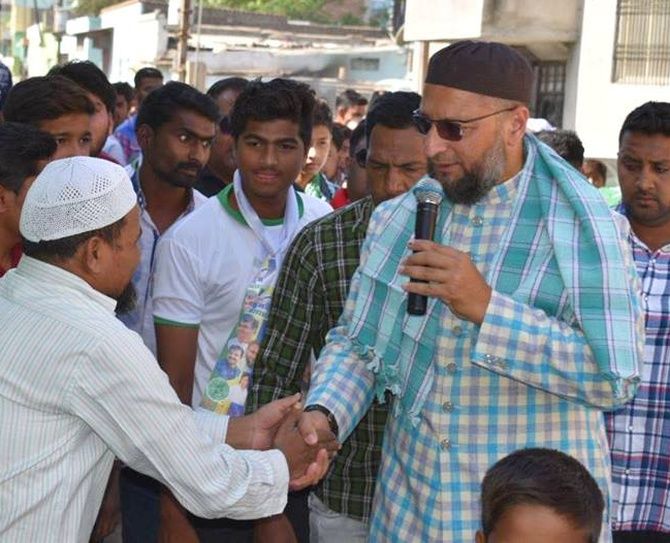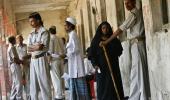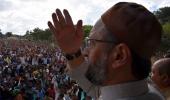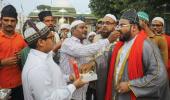With most political parties failing to articulate the concerns of Muslims, who account for 15 per cent of the population and can swing the electoral outcome in 21 constituencies, the AIMIM hopes to make a mark in the ongoing assembly elections, says Shafeeq Rahman.

Despite Muslims constituting 15 per cent of total population of Jharkhand, the ongoing state assembly election campaign is almost silent on their adequate representation and other community-related matters, especially the incidents of mob lynching.
The hate crimes should have been among the major political issues in the state, as Jharkhand has accounted for 21 cases of mob lynching during 2016-2019, out of which 13 victims were Muslim.
Moreover, a Union minister and a member of the state government had garlanded the convicts in a mob lynching case after they were granted bail.
Paradoxically, the entire election campaign is mum on these concerns while the diatribe which hurts Muslims is rampant.
Muslim influence in state politics has been minimised since the carving out of Jharkhand from Bihar in 2000.
During the last three assembly elections, the best representation (of Muslims) was in 2009 when four candidates from the community won, while only two members were elected in the last assembly election held in 2014, indicating a 2.46 per cent representation for 15 per cent of the population.
In neighbouring Bihar, with 16 per cent population of Muslims, the community has 10 per cent representation post the last assembly election.
In several other states, Muslims, with a similar population ratios, have much better representation in their assemblies.
Muslims should have around 12 out of 81 members of the legislative assembly as per their population ratio in Jharkhand.
The grand alliance comprising the Congress, the Jharkhand Mukti Morcha and the Rashtriya Janata Dal -- formed to consolidate the tribal and Muslim votes -- also did not have a single Muslim candidate in the Lok Sabha election of 2014.
After overturning the demand for their representation in Lok Sabha, a flimsy promise was made for the nomination of Muslims in Rajya Sabha from the state. But that also seems difficult to be fulfilled.
However, the grand alliance has now fielded seven Muslims in the ongoing assembly elections.
As per the nationwide electoral strategy, the Bharatiya Janata Party this time also has not given a ticket to any Muslim candidate to polarise other communities in its favour and to make an impression that the BJP is the only party not involved in 'Muslim appeasement'.
The securing of more seats by the BJP, thus stipulates a lower representation of Muslims in the power structure.
The political marginalisation of Muslims in Jharkhand is mainly because of a lack of community voices.
There is no political party like the All India Majlis-e-Ittehadul Muslimeen of Telangana, the All India United Democratic Front of Assam or the Indian Union Muslim League of Kerala.
Muslims are also not considered a consolidated vote bank for any specific mainstream party, like they are associated with the Samajwadi Party and the Bahujan Samaj Party in Uttar Pradesh and with the RJD and Janata Dal-United in Bihar.
Muslims of Jharkhand are also unable to forge a social alliance with tribals.
Mob lynching could become an important electoral issue for the tribals as well as for the Muslims, but both have failed to raise their concern jointly.
Jharkhand is one of the most religiously diverse states of the country.
It has a population share of 68 per cent Hindus, 15 per cent Muslims, 4 per cent Christians and 13 per cent other religious groups and also has a dominant Scheduled Tribe population (26 per cent).
The districts of Pakur and Sahibganj have a Muslim population above 30 per cent while five districts have more than 20 per cent Muslims.
Muslims' share in the total population is above 20 per cent in 16 and above 30 per cent in five assembly constituencies.
With such a demographic composition in the state, Muslims potentially can decide the fate of candidates in 21 seats and thus enhance their representation.
To fill the vacuum of Muslim political voices in the state, Asaduddin Owaisi's AIMIM is contesting around 20 seats in this election.
Its leaders are reaching out to Muslims and in their rallies, calling for equality for Muslims.
After its electoral strides in Bihar, the party probably can succeed to win two or three seats in Jharkhand.
Owaisi's entry can upset the electoral calculation of traditional parties and mar the prospects of the grand alliance to form the next government.
To thwart the kind of political fissure in Maharashtra due to the splitting of votes between AIMIM and Prakash Ambedkar’s Vanchit Bahujan Aghadi, the grand alliance must address the concerns of the Muslim community and provide them equal opportunities, instead of merely frightening them with the possibility of victory of their rivals.
Shafeeq Rahman is a Delhi-based researcher. He can be contacted at news@rediff.co.in.











 © 2025
© 2025